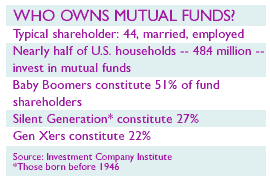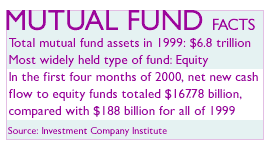|
Funds vie for your dollars
|
 |
June 27, 2000: 12:27 p.m. ET
Morningstar conference assesses funds' strategies in light of market tumult
|
NEW YORK (CNNfn) - The nearly $7 trillion mutual fund industry is under pressure to reinvent itself against the toughest odds.
Contending with record volatility, increasing competition and a dot.com, growth-dominated world that can make even the most devout buy-and-hold investors doubt their strategies, the mature fund industry and its portfolio managers have to work twice as hard to win and keep your investing dollars.
"I think the most salient issue right now (in the industry) is how to make a buck," said Reuben Brewer, manager of mutual fund research at ValuLine.
A roller-coaster market has crippled some seasoned managers, slammed the brakes on once-eye-popping gains and compounded the pressure on everyone to deliver attractive returns in a field flooded with nearly 11,000 mutual funds.
At the same time, less expensive, more flexible investment options such as exchange-traded funds (ETFs) and folios are sprouting regularly, offering more choice to the nearly 83 million Americans who invest in mutual funds.
How successfully they adjust to those factors without losing market share is among fund companies' biggest challenges and will be one of the hot issues at the Morningstar Investment Conference, to be held in Chicago later this week, said Sara Bush, a Morningstar analyst and one of the conference organizers.
A question of expense
Addressing an audience of nearly 1,000 financial planners, fund experts and investors, portfolio managers from top fund companies such as Janus, Gabelli, Oakmark, Van Wagoner, Legg Mason, and Franklin Templeton will lead panels assessing where the market is heading, as well as what sectors, strategies and stocks look promising.
Got fund questions? CNNfn.com will conduct a roundtable discussion at the Morningstar conference with several top-performing fund managers. They are ready to answer your investment questions about the market.
Click here to find out more.
But few investment discussions conclude without touching on one of investors' top concerns: expense. Analysts have been calling on fund companies to lower their expenses to remain competitive, and the presence of ETFs raises that issue in spades, Bush said.
ETFs will be a topic at one of the conference's keynote addresses, by Patricia C. Dunn, chairwoman of Barclays Global Investors, which is a leading ETF provider.
 Expense ratios for ETFs, which trade like stocks and mirror everything from indexes to individual sectors, countries and even asset classes, can be nearly half that of some of the least expensive index funds, which until recently were the lowest-cost funds available. Expense ratios for ETFs, which trade like stocks and mirror everything from indexes to individual sectors, countries and even asset classes, can be nearly half that of some of the least expensive index funds, which until recently were the lowest-cost funds available.
They can be pricey, however, if you invest in them by contributing small amounts regularly, since you will pay a commission to a brokerage each time you buy ETF shares. Investors who stand to benefit from them the most, experts say, are those with large amounts of money who are willing to pay the cost of trading frequently for the benefit of timing the market, and buy-and-hold investors who will trade infrequently over a long period of time.
The fund industry has shown some resistance to ETFs except as an outlet for short-term investors who wish to trade frequently. Not surprisingly, fund companies were also slow to embrace indexing.
"Nobody really wanted to come out with an index fund," said Sheldon Jacobs, editor of the newsletter No-Load Fund Investor. That is, until they saw Vanguard's success in doing so. Their initial resistance, he explained, was due in part to the fact that index funds don't add to a company's bottom line as handsomely as an actively traded fund that can charge higher management fees.
Big challenge still a way off
For now, the direct threat ETFs pose is limited mostly to index funds, experts say, since there are not yet any actively managed exchange-traded options.
Ryan Jacob, portfolio manager of the Jacob Internet Fund who will lead a discussion on technology investing at the conference," isn't that worried. "I think there will be a market for those kinds of products," he said. But when it comes to sector funds, he added, "People are looking for active management."
 That's because there are usually only a few good companies in a nascent area like the Internet, he explained, and an index fund, whether exchange-traded or not, is not going to offer the investor the greatest possibilities for returns. That's because there are usually only a few good companies in a nascent area like the Internet, he explained, and an index fund, whether exchange-traded or not, is not going to offer the investor the greatest possibilities for returns.
That remains to be seen. ETFs are still quite new. Nevertheless, they are likely to raise the perennial question of the merits of active versus passive management. To date, there is evidence that broad index investing can deliver better returns more cost-effectively in the long-term than actively managed funds.
Of course, actively managed ETFs may not be that far off. If and when they do arrive, watch out, Sheldon Jacobs said. "(They) are going to make big inroads."
Changing of the guard
ETFs aren't the only results of a fast-changing market that are influencing the fund industry. More broadly, the explosion in growth stocks, particularly technology, which helped fuel the bull market, has given many portfolio managers reason to reassess their investment strategies.
One conference panel on value investing will address that issue head-on. The panel will be led by Legg Mason's Bill Miller, whom Bush characterizes as the "new face" of value for decisions such as his purchase of AOL when many were saying it was overpriced, and The Clipper Fund's James Gipson, who represents the more traditional value manager.
They, along with Christopher Davis of Davis Selected Advisers, will debate what value means in a volatile, growth-oriented market, and where value lies in sectors such as technology.
How you stand to benefit
Other changes -- the advent of online investing and the introduction of fund supermarkets -- have brought about greater choice and access for the individual investor, and that's good news, said Gabelli Growth portfolio manager Howard Ward, who will lead a panel on growth investing with managers from Janus and MAS Funds.
"It's much easier for the consumer to gain advice and invest in a broader array of products," Ward said. But that means to stay competitive fund companies will have to make themselves available in the supermarkets instead of just through their proprietary sales forces and engage in a continuous dialogue with fee-only financial planners.
"You have to have an open architecture ... (and) make it easy for the people to get their money to you," he said.
More choices, but not always better ones
The battle to bolster assets under management means fund firms will need to take a multilateral approach to get you and your dollars in the door. And that means you need to be careful shopper who is reluctant to buy into any hype about new products and services.
"For the individual investor, it's going to require a lot more scrutiny. Just because it's a brand new fund doesn't mean you have to buy it. Just because a sector is hot doesn't mean you have to invest in it," Brewer said.
And at the end of the day, if you're still wondering where to put your money, Ward says look to the one factor that is sure to distinguish the best from the wannabes: solid returns over a number of years. "Providing consistently good performance does get the attention of the marketplace," he said. 
|
|
|
|
|
 |

|

